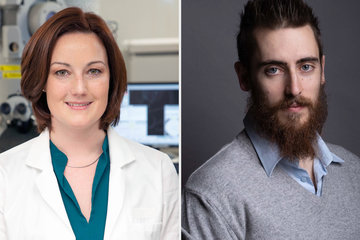Concentrated excellence – first Max Planck Schools selected
Three Schools selected for a five-year pilot phase
Germany has gained a new graduate education brand with international appeal: in 2018, three selected Max Planck Schools will open for an initial five-year pilot phase. Each School brings together exceptional scientists from across Germany in an innovative field of research. This intelligent networking method aims to further enhance the visibility of German science in the international arena, thereby attracting outstanding junior scientists from around the world.

The Max Planck School of Cognition, the Max Planck School of Photonics and the Max Planck School on Physics, Chemistry and Construction of Life* prevailed in the competition. The news was announced on Monday by German Federal Minister of Education and Research Johanna Wanka, the President of the Max Planck Society Martin Stratmann, and the President of the German Rectors' Conference Horst Hippler. The three selected Schools are composed of members of 21 universities and 31 institutes from non-university research organizations. This underlines the cross-institutional nature of the initiative.
The Schools, which will see leading scientists from universities and non-university research organizations collaborate in supra-regional networks, will enable excellent higher education graduates from around the world to achieve their doctorate – where possible through a “fast track” scheme that includes a master’s degree. All academic degrees obtained through the schools will be conferred by the participating universities.
“With the Max Planck Schools, today marks the start of a new instrument for cutting-edge research that builds on the strengths of German science: a diverse landscape of excellent, innovative basic research, housed in a variety of universities and non-university organizations. The resourceful networking of various elements will create a major, world-class entity. As a result, the Max Planck Schools will further promote German science on the international stage and attract exceptional researchers both domestically and from abroad”, said Johanna Wanka, German Federal Minister of Education and Research.
By bringing leading researchers in future-oriented topic areas from across the country together in one School, the objective is to enhance global visibility and competitiveness with top international universities. The Schools represent a new form of collaboration in graduate education. They complement other highly successful regional collaboration formats, such as the German Universities Excellence Initiative Graduate Schools or the International Max Planck Research Schools (IMPRS), to form a national network. The three pilot Schools will be supported for an initial period of five years by the German Federal Ministry of Education and Research (BMBF), with total funding of 9 euros million per year.
A selection committee headed by Martin Stratmann and Horst Hippler, Presidents of the Max Planck Society and the German Rectors' Conference respectively, selected the three pilot Schools from eight proposals across a wide spectrum of topic areas. Three representatives each from the participating universities, the Max Planck Society and the other non-university research organizations – the Fraunhofer-Gesellschaft, the Leibniz Association and the Helmholtz Association – discussed the proposals submitted. The committee then agreed on the three selected pilots.
“As supra-regional research and education networks, the Max Planck Schools bring together the best minds in German universities, the Max Planck Society and other non-university research organizations. This much was clear in the impressive draft proposals. I am delighted that the initiative stands on such a broad strong of players in the German scientific landscape”, said Max Planck President Martin Stratmann. He added: “Germany has top members of the scientific community at various locations. This distribution is a great advantage from a social, and above all, an economic perspective. However, if we want to compete in the international arena for the most creative minds, then we must concentrate this excellence to enhance its visibility.”
The President of the German Rectors' Conference (HRK), Horst Hippler, agreed: “The Max Planck Schools will be able to help guide particularly talented foreign doctoral candidates towards smaller locations where outstanding scientists are conducting research but, for instance, are unable to set up a graduate college of their own. Thus, with the Max Planck Schools, we are creating an additional opportunity to make our dispersed research excellence visible internationally as a strength of the German science system. As a central actor in this system, the universities continue to bear decisive responsibility for the quality of doctorates in the new model.”
The Max Planck Schools are an inter-organizational scientific initiative. This is emphasized by their name: “Max Planck Schools – a joint initiative between German universities and the German research organisations”. The three pilot schools’ concepts will be further refined before implementation; the contracts between the respective partners will then be agreed on that basis. Only then can a call for applications be placed in international scientific journals. The evaluation of the pilot phase will show whether a promising architecture has been successfully developed for the Max Planck Schools, and whether the programme should be continued.
Update in 2018:
*Please note that the School's name has been amended to 'Max Planck School Matter to Life'.












